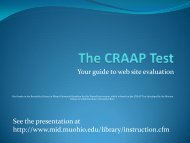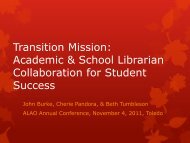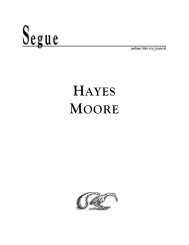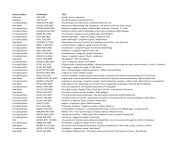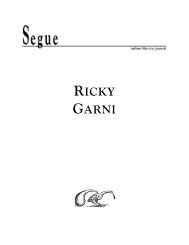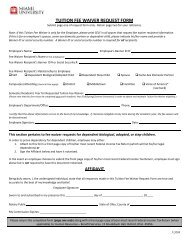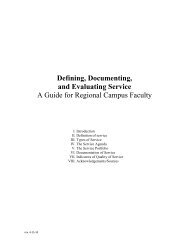Bibliography of Assessment Alternatives: Portfolios
Bibliography of Assessment Alternatives: Portfolios
Bibliography of Assessment Alternatives: Portfolios
Create successful ePaper yourself
Turn your PDF publications into a flip-book with our unique Google optimized e-Paper software.
criteria students have developed to critique technical writing, and lots <strong>of</strong> help with<br />
implementing these ideas, including incorporating them into grading.<br />
(AL# 470.6REVTEW)<br />
Borko, Hilda, Paul Michalec, Maria Timmons, et al. Student-Teaching <strong>Portfolios</strong>: A Tool<br />
for Promoting Reflective Practice, 1996. Available from: Author, School <strong>of</strong> Education,<br />
Campus Box 249, University <strong>of</strong> Colorado, Boulder, CO 80309, (303) 492-8399,<br />
e-mail: hilda.borko@Colorado.edu<br />
This is a paper presented at the annual meeting <strong>of</strong> the American Educational Research<br />
Association, New York, April 1996. This article explores student-teaching portfolios as a<br />
tool for promoting reflective practice. The authors focus on the experiences <strong>of</strong> a group <strong>of</strong><br />
pre-service teachers whose major assignment for the seminar was to construct a studentteaching<br />
portfolio. In interviews and written reflections, participants commented most<br />
frequently about benefits <strong>of</strong> the portfolio experience; for example, the opportunity to reflect<br />
on their teaching and students' learning. The most frequent message about costs was that the<br />
portfolio assignment competed with student teaching for their time and energy. Suggestions<br />
for modifying the portfolio project addressed ways to strengthen its positive features (e.g.,<br />
peer collaboration, sample portfolios, pr<strong>of</strong>essional value) and decrease the impact <strong>of</strong> negative<br />
features (e.g., timing, structure). The article concludes with a discussion <strong>of</strong> modifications we<br />
made to the portfolio project based on the authors' learnings and the student teachers'<br />
insights.<br />
(AL# 130.4STUTEP)<br />
Brandt, Mary E. When Are Writing <strong>Portfolios</strong> Powerful? Located in: The Kamehameha<br />
Journal <strong>of</strong> Education 4, Spring 1993, pp. 97-104. Available from: Early Education<br />
Division, Kamehameha Schools, 1887 Makuakane St., Honolulu, HI 96817.<br />
The author presents the position that the real value <strong>of</strong> portfolios is in the service <strong>of</strong> student<br />
learning, and that if we are going to get the maximum benefit from portfolios, we should use<br />
them to do what only they are capable <strong>of</strong> doing in instruction—inviting in-depth student<br />
<strong>Assessment</strong> Resource Library, (503) 275-9582 9 Portfolio <strong>Bibliography</strong><br />
(formerly Test Center) NWREL, December 1996




